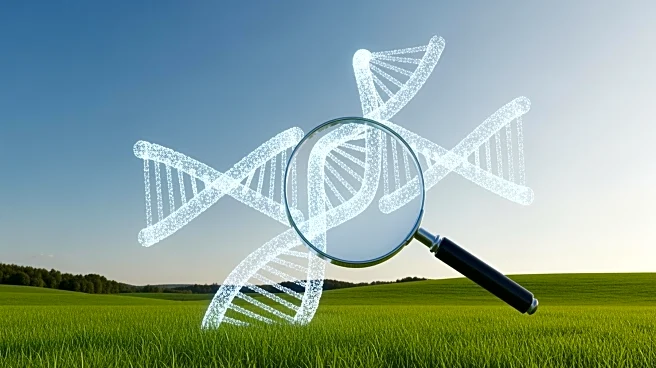What's Happening?
Recent advancements in taxonomy classifiers have significantly improved the accuracy of rumen microbiome analysis. The study highlights the limitations of existing human-centric databases in accurately analyzing non-human microbiomes, such as those found
in the rumen. To address this, researchers have developed manually weighted taxonomy classifiers (MWTC) that integrate weight assignment and additional preprocessing steps. These classifiers have shown to provide more accurate annotations, particularly at lower taxonomic levels, compared to unweighted or average weighted taxonomy classifiers. The study utilized data from native Korean Hanwoo cattle and demonstrated that MWTC achieved higher classification counts and lower error rates, preserving the relative abundance of key microbial taxa in rumen samples.
Why It's Important?
The development of more accurate taxonomy classifiers for rumen microbiome analysis has significant implications for agricultural and environmental research. By improving the precision of microbial identification, these classifiers can enhance our understanding of the rumen ecosystem, which is crucial for optimizing livestock health and productivity. This advancement could lead to better dietary formulations and management practices, ultimately benefiting the agricultural industry. Additionally, the ability to accurately classify rumen microbiota can contribute to more sustainable livestock farming practices by improving feed efficiency and reducing methane emissions, a major contributor to climate change.
What's Next?
Further validation of the MWTC using datasets from diverse cattle breeds is necessary to assess its generalizability for breed-specific microbiome analyses. Additionally, testing the classifier's performance across different hypervariable regions of the 16S rRNA gene is warranted. As the study was based on data from Hanwoo cattle, expanding the research to include other breeds will help determine the broader applicability of the MWTC. The continued development and refinement of these classifiers could lead to more detailed studies on microbial communities, enhancing our understanding of their roles in various ecosystems.
Beyond the Headlines
The study underscores the importance of developing non-human-centric databases for microbiome research. The reliance on human-centric databases has limited the accuracy of non-human microbiome analyses, highlighting the need for more inclusive and diverse datasets. This development could pave the way for more comprehensive microbiome studies across different species, contributing to a deeper understanding of microbial ecology and its impact on various biological systems.

















